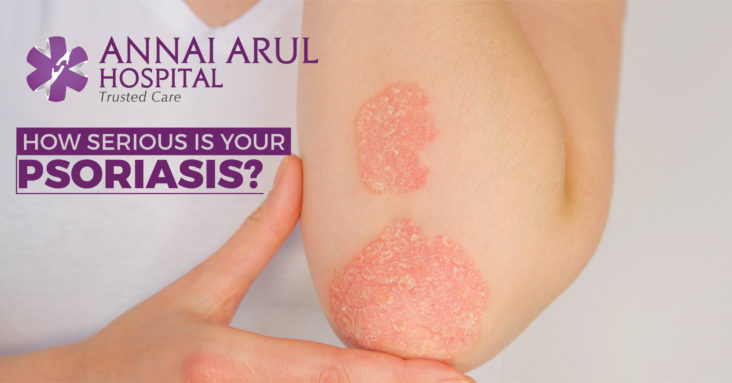Psoriasis is usually graded based on the area of skin it covers. Doctors also classify it based on how red, scaly and thick the patches are. Other criteria for grading is the extent of damage it does to the quality of your life. Yet some other scales grade psoriasis into two, either mild or moderate to severe.Based on severity, psoriasis can be mild, moderate or severe. Based on morphology, the most common type are plaque type, erythrodermic, rupoid, psoriasis, guttate psoriasis, pustular psoriasis.
Based on sites:
Mild Psoriasis
This is the most common type of psoriasis clinically encountered. The mild cases affect less than 3% of the body surface. There are also few lesions scattered on the arms and legs. The scalp is another area that shows fine, silvery scales. This type of psoriasis is mainly treated with topical drugs like creams or ointments.
Moderate Psoriasis
Psoriasis attains the moderate degree when patches cover 3% to 10% of the body area. Once moderate psoriasis spreads, creams and lotions have no effect instead you may need phototherapy or light therapy in combination with prescription drugs. This type of psoriasis can affect the quality of your life to a great extent.
Severe Psoriasis
If the psoriasis infliction covers 10% or more of your skin then you are said to suffer from the more severe type of psoriasis. Here size of the patches does not matter since smaller patches in places like the palms and soles of your feet can be more severe. The treatment in such cases will include biological drugs and other systemic therapy that work on the whole body rather than only the skin. Based on sites affected psoriasis can be clasiified as scarp psoriasis, sebo psoriasis, nail psoriasis, flexual psoriasis, palmoplantar psoriasis.
Erythrodermic Psoriasis
This type of psoriasis occurs in less than 3% of people and is characterised by scales and blisters called pustules that cover almost 90% of the body surface. The skin tends to peel off in large, red sheets. The lesions due to skin peeling off is much painful and very itchy. This type can be deadly and need immediate medical care.
Another type, called pustular psoriasis starts with large areas of the skin turning red and the surface getting filled with pus in quick time.
Psoriasis impacts life
Psoriasis is not only physical disease, but it has a significant impact on your self-esteem and the way you do day-to-day chores. Hence the importance of quality of life in a doctor’s diagnosis. The experts use Dermatology Life Quality Index along with PASI (Psoriasis Area ).


